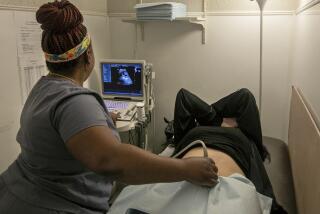Early-pregnancy Weight Gain Linked to Gestational Diabetes
Women have long been told that gaining weight before becoming pregnant or being overweight at the start of pregnancy puts them at higher risk for gestational diabetes. But a new study finds that the first trimester is the most crucial time for weight gain that can increase the danger of developing the condition.
The study, released Monday in the journal Obstetrics & Gynecology, looked at data from an ethnically diverse group of women who had babies between 1996 and 1998; 345 women had gestational diabetes, and 800 who had not developed the disease served as a control group. Gestational diabetes is diabetes that starts during pregnancy; it can disappear after giving birth but has the potential to affect mother and child for years.
“When we looked at weight gain by trimester, we found that association [with gestational diabetes] was mainly due to excess weight gain during the first trimester,” said Monique Hedderson, the study’s lead author and a scientist at the Kaiser Permanente division of research in Oakland.
During that time, women who gained more weight than is recommended by the Institute of Medicine, or IOM, had a 50% greater risk of developing gestational diabetes than women who were within or below the IOM recommendations during that period.
The women in the highest category of weight gain -- those who gained between 0.6 pounds and 4 pounds per week in the first trimester -- had an 80% increased risk over women who were within or below the IOM recommendations.
The link between weight gain during the first trimester and gestational diabetes was stronger among women who were overweight at the start of their pregnancies. Obese women (those with a body mass index of 30 or more) in general gained the least weight in that time, yet that group was more at risk for developing gestational diabetes. There was no link between weight gain during the second trimester and gestational diabetes.
Hedderson and the study’s other authors think that the early pregnancy weight gain may increase insulin resistance and in turn exhaust the pancreas’ beta cells. Beta cells create and release insulin, which controls blood glucose levels.
“As all pregnancies progress,” Hedderson said, “an increase in insulin resistance occurs. Most women’s beta cells are able to compensate by releasing more insulin, but if a woman has reduced beta cell capacity caused by weight gain, she may not be able to compensate for this normal occurrence.”
Obese women, she added, could be at such a high danger for developing gestational diabetes that any excess weight gain may push them into the disease.
In 2009, the IOM issued pregnancy guidelines that included some new recommendations for weight gain. For underweight women they suggested gaining 28 to 40 pounds, for normal-weight women 25 to 35 pounds, for overweight women 15 to 25 pounds, and for obese women 11 to 20 pounds.
Previously, it was suggested that obese women gain 15 pounds on the low end, with no ceiling noted.
However, Hedderson said, many women overestimate the amount they’re supposed to eat during pregnancy. “Women only need an extra 100 to 300 calories a day during pregnancy,” she said.
Gestational diabetes has long- and short-term consequences, including an increased risk for early delivery and C-section, and greater possibility for obesity and Type 2 diabetes later in life for the babies.
“After women deliver, we try to get them back to their ideal pre-pregnancy weight, so if they get pregnant again they’ll be in good shape,” said Dr. Lauren Golden, assistant professor of clinical medicine at the Naomi Berrie Diabetes Center at Columbia University Medical Center in New York City. She did not participate in the research.
“The study offers important information and a more formal way to now look at that. . . . It makes sense to tell women to look at their diet before pregnancy.”
The study also has a strong message for women who are obese and contemplating pregnancy, said Dr. Mark B. Landon, professor and interim chairman of the department of obstetrics and gynecology at the Ohio State University College of Medicine in Columbus.
“If obese women were to modify their diet and thus lose weight prior to becoming pregnant, that would probably reduce the risk for gestational diabetes, even more so than a modest reduction in weight gain in the first trimester,” he said.
jeannine.stein@ latimes.com
More to Read
Start your day right
Sign up for Essential California for news, features and recommendations from the L.A. Times and beyond in your inbox six days a week.
You may occasionally receive promotional content from the Los Angeles Times.






